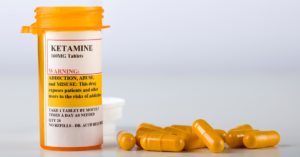In the realm of substance abuse and addiction, new challenges constantly emerge, presenting people with new substances that can lead them down a dangerous path. One such phenomenon is the rise of research chemicals. These substances, often sold under innocent-sounding names, carry significant risks. Thus, it’s essential to understand their devastating effects and true nature.
What are Research Chemicals?
Research chemicals, also known as designer drugs or new psychoactive substances (NPS), are synthetic substances created to mimic the effects of controlled substances. They also go by the names designer drugs and legal highs. The term research chemicals is a broad umbrella encompassing many substances, such as synthetic cannabinoids, novel stimulants, dissociatives, and hallucinogens.
These substances are developed by modifying the chemical structure of existing drugs or by creating entirely new compounds. Research chemicals are usually manufactured in underground laboratories, often in countries with lax regulations.
The story of their inception dates back to late 2008 when a batch of a substance known as Spice, or synthetic marijuana, was confiscated and analyzed in Ohio, marking the first encounter of U.S. authorities with these novel compounds.
Are Research Chemicals Legal?
Research chemicals often fall into a legal gray area, as they may be sold openly under the pretense of research or industrial use, circumventing existing drug control laws.
When a potentially dangerous research chemical is discovered, the substance undergoes chemical analysis by bodies such as the U.S. Food and Drug Administration (FDA). If found to threaten public health, regulatory actions are taken, and the substance is typically banned or classified as a controlled substance. These measures protect people from the potential dangers of using these substances.
However, the cat-and-mouse game between black market dealers, chemists, and regulatory authorities poses a significant obstacle to effective regulation. These illicit actors are skilled at slightly modifying existing drugs’ chemical structure, creating new variations that can quickly be reintroduced to the market. By making these subtle alterations, they evade existing regulatory frameworks and render the previously banned compounds technically legal again.
The Allure of the Unknown
One of the reasons research chemicals are gaining popularity is their novelty. Since they are relatively new and not yet regulated, they are not detectable by standard drug tests. This anonymity becomes attractive for those seeking to bypass legal repercussions or workplace screenings. The allure of experimenting with something unfamiliar can be enticing for individuals in recovery looking for alternative ways to achieve altered states of consciousness.
The Dark Side of Research Chemicals
While research chemicals’ euphoria and mind-altering effects may seem tempting, their use unleashes many risks. These substances often have unpredictable potency and varying chemical compositions, making them incredibly dangerous. Since they are not subject to regulatory oversight, there is no way to ensure purity or safety. The absence of quality control measures means that users essentially play Russian roulette with their well-being.
RunTheDMT shared a harrowing tale of his experiences with U-47700, a dangerous research chemical. In his Reddit post, he described the terrifying ordeal in detail. Initially, he felt his heart rate slowing down, causing panic to set in. Desperate for a solution, he turned to meth and took an enormous hit, hoping it would stabilize him. Although it provided temporary relief, he still felt weak and experienced fluctuating heart rates and tingling sensations.
In his words, the effect came “in waves and brings my heart rate down, and then I get very tingly and weak, this is seriously scaring the shit out of me. Almost ready to call an ambulance if this keep happening.” He added, “that tingling feeling and my body going numb is going to haunt me for a while.”
Hidden Dangers and Health Risks
Research chemicals can have severe physical and psychological consequences. Due to their unpredictable nature, users may experience adverse reactions, including panic attacks, hallucinations, seizures, and coma. Those who consume research chemicals frequently require hospitalization due to severe intoxications. There have also been numerous unexplained suicides where the individuals had used spice beforehand.
Moreover, those grappling with addiction may turn to research chemicals to alleviate the discomfort associated with drug withdrawal. However, relying on these drugs as a substitute can be risky and counterproductive, perpetuating the cycle of substance abuse rather than promoting recovery.
Additionally, some mistakenly believe that because these substances are available in stores or online, they must be safer than their black market counterparts. Unfortunately, this assumption is inaccurate and can lead to severe consequences. The truth is that the safety of research chemicals cannot be guaranteed due to their unpredictable nature.
Seeking Professional Help
So, if you or someone you know is struggling with addiction, don’t hesitate to reach out for help. While the grips of addiction can be tight, it’s never too late to loosen them.
At Diamond Recovery Treatment Center, we are dedicated to guiding individuals on the pivotal path to reclaiming their lives from the grip of substance dependence. Our commitment lies in creating a compassionate and supportive environment where you can find strength and empowerment to overcome addiction.
We firmly believe in the power of knowledge and provide a wealth of resources and educational materials to equip you. Whether it’s connecting with additional treatment options or offering ongoing support, we stand by you every step of the way.






